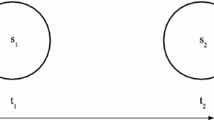Abstract
Jonathan Westphal’s recent paper attempts to reconcile the view that propositions about the future can be true or false now with the idea that the future cannot now be real. I attempt to show that Westphal’s proposal is either unoriginal or unsatisfying. It is unoriginal if it is just the well-known eternalist solution. It is unsatisfying if it is instead making use of a peculiar, tensed truthmaking principle.
Similar content being viewed by others
Notes
The distinction drawn here is drawn in many places, including Crisp (2004), which Westphal cites. Crisp writes, “To say of x that it exists in this sense is to claim merely that our most inclusive quantifiers range over x” (2004, p. 16).
Westphal claims that some philosophers have endorsed some of the other options he lists. For instance, he claims that McTaggart’s view is that neither past, future, nor present objects exist. But, to use Quine’s terminology, this confuses ideology (A-Theory vs. B-Theory) with ontology (Eternalism vs. Presentism vs. Growing Block Theory vs. …). I conjecture that Westphal’s reluctance to wholeheartedly embrace Eternalism rests on this confusion.
Given, that is, that the tensed elements of Tensed Truthmaker aren’t analyzed away, in the manner in which an Eternalist would do it. If it is, then we are back at the Eternalist solution.
References
Crisp, T. M. (2004). Defining presentism. In D. Zimmerman (ed.), Oxford studies in metaphysics (Vol 1, pp. 15–20). Oxford: Oxford University Press
Dummett, M. (2004). Truth and the past. New York: Columbia University Press
Markosian, N. (2002). Time. In E. Zalta (ed.), The Stanford encyclopedia of philosophy (winter 2002 edition). Retrieved March 21, 2007 from http://plato.stanford.edu/archives/win2002/entries/time/
Sider, T. (2001). Four-dimensionalism: An ontology of persistence and time. New York: Oxford University Press
Westphal, J. (2006). The future and the truth-value links: A common sense view. Analysis, 66, 1–9
Acknowledgments
I am grateful to David Barnett, Brad Monton, and an anonymous referee for helpful suggestions and discussion.
Author information
Authors and Affiliations
Corresponding author
Rights and permissions
About this article
Cite this article
Heathwood, C. On what will be: reply to Westphal. Erkenntnis 67, 137–142 (2007). https://doi.org/10.1007/s10670-007-9050-5
Received:
Accepted:
Published:
Issue Date:
DOI: https://doi.org/10.1007/s10670-007-9050-5




